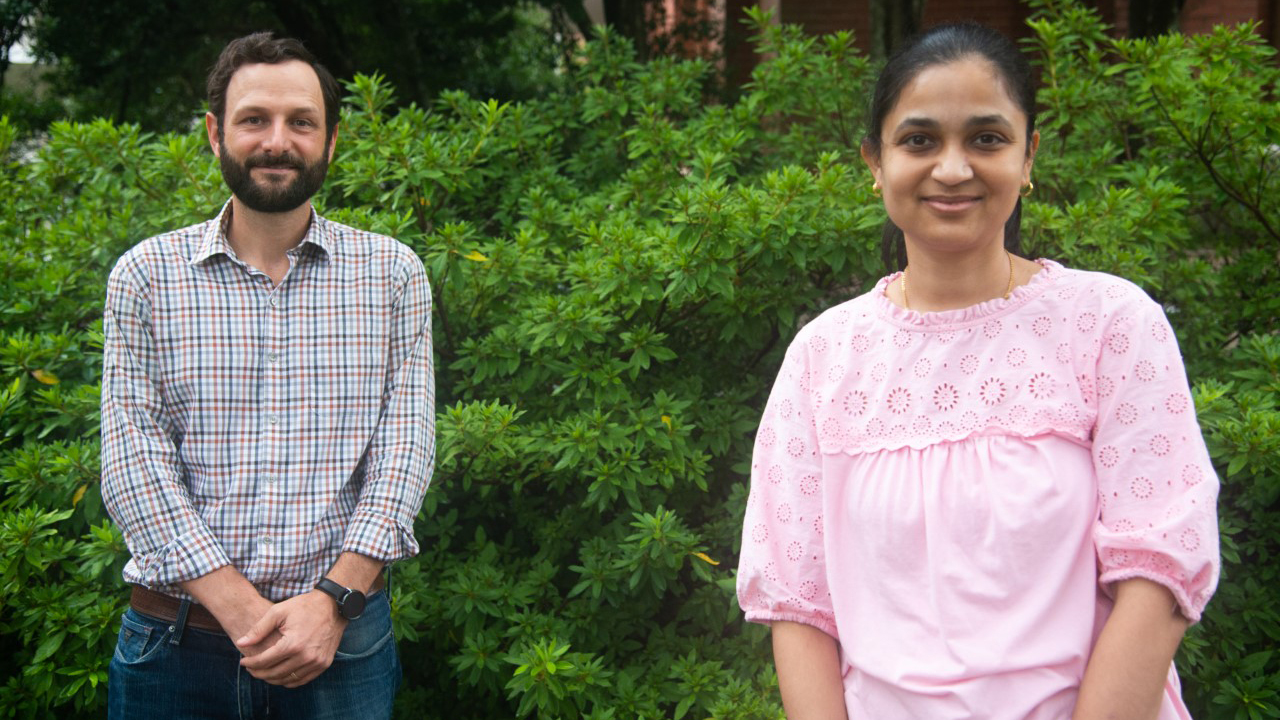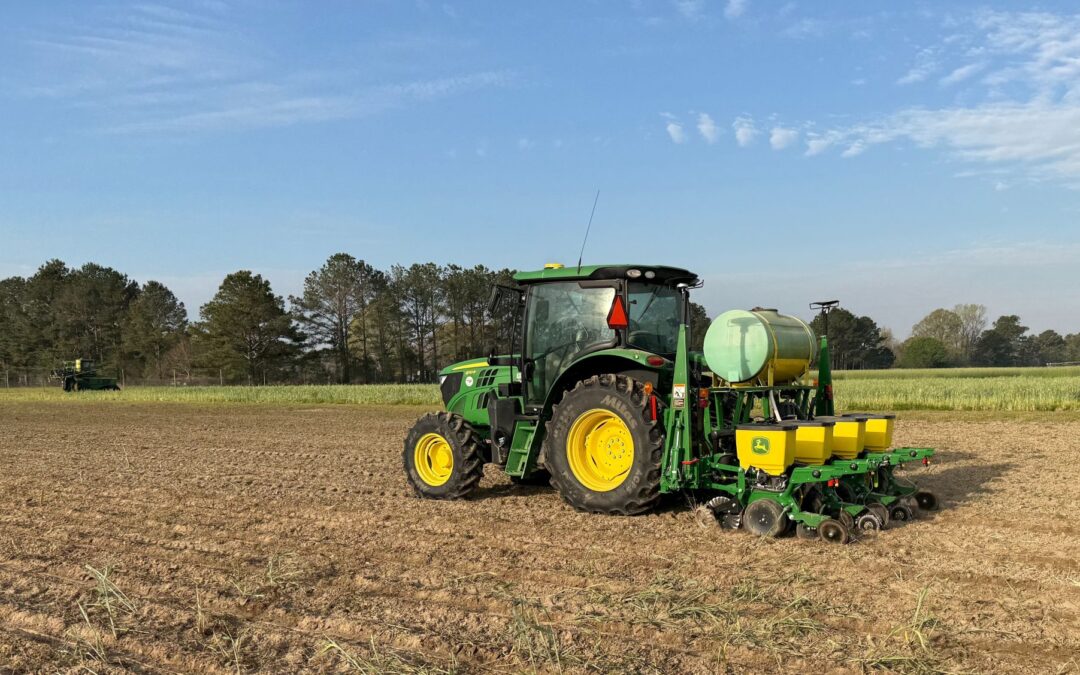By Paul Hollis / Sep 16, 2020 8:15:41 AM
Two Auburn University College of Agriculture researchers have been named recipients of the Foundation for Food and Agriculture Research (FFAR) 2019 New Innovator in Food and Agriculture Research, an award granted to early career scientists supporting research in one of the foundation’s six challenge areas.
Paul Dyce, assistant professor in the Department of Animal Sciences, and Neha Potnis, assistant professor in the Department of Entomology and Plant Pathology, were two out of only seven U.S. researchers to receive the prestigious FFAR New Innovator Award for 2019.
The seven recipients will receive a total of $1,744,803 over three years, with matching funds from each recipients’ respective institutions to double FFAR’s investment for a total of $3,494,132.
The New Innovator in Food and Agriculture Research Award provides early career scientists with funding to conduct audacious food and agriculture research. Investing in these scientists in the early years of their careers allows them to pursue innovative and transformational ideas uninhibited by the pressure of identifying their next grant.
“Preparing for the next frontier of agricultural innovation starts with investing in today’s scientific workforce,” said FFAR’s Executive Director Sally Rockey. “We are thrilled to support emerging superstars in food and agriculture research as they develop cutting-edge strategies to revolutionize food production, processing and distribution.”
“The College of Agriculture is truly honored to receive two of the seven New Innovator in Food and Agriculture Research awards,” said Henry Fadamiro, associate dean for research and associate director of the Alabama Agricultural Experiment Station.
“To receive two awards in one year speaks to the quality and creativity of our faculty,” Fadamiro said. “In total, five faculty members in the college have received grants from FFAR in recent years. These awards are partly the result of increased engagement with FFAR and reflect the growing reputation of the college in cutting-edge research and innovations.”
Potnis said the award will provide her an opportunity to leverage basic scientific findings to devise immediate and long-term solutions to tackle endemic plant diseases.
“I am especially excited about multi-disciplinary collaborations with Extension Plant Pathologist Ed Sikora, Agro-Climatologist Di Tian, Agricultural Economist Ruiqing Miao and Epidemiologist Karen Garrett.
“This multidisciplinary collaborative project will provide an excellent opportunity for my graduate students to receive training in a wide range of research topics ranging, from field surveys, molecular methods, microbiome study, modeling, seed pathology, genomics/metagenomics and, most importantly, communication with growers.”
Changes in agronomic practices, increased global trade, and intensified monoculture system in modern agricultural ecosystems have predisposed modern agriculture to a significant challenge of emerging diseases, and increased incidences of endemic disease outbreaks impact sustainable crop production, Potnis said.
“Disease outbreaks continue to occur despite recommendations of various disease management strategies,” she said. “Such a failure to manage endemic diseases suggests a need to change the view in which disease management strategies are implemented.”
This FFAR-funded project will consider a broader view of ecological, epidemiological and evolutionary implications of modern agricultural practices on the incidence of disease outbreaks and pathogen infectivity, Potnis said.
“This project will then leverage the knowledge on the factors influencing host susceptibility and pathogen adaptation to propose modifications in disease management strategies,” she said. “Although this project will utilize bacterial spot of tomato/pepper as a pathosystem for investigation, the findings from this work — including techniques and concepts — will be applicable across various endemic pathosystems.”
The project will build on a region-wide effort involving fields across the Southeastern U.S. to identify variable importance of the risk factors that are responsible for recurring disease outbreaks.
“We will also address the complex trade-off decisions that growers face in managing multiple diseases,” Potnis said. “The outcomes from this project include revised disease management recommendations avoiding identified risk factors, thereby providing ideal targets for breeding for disease resistance. The overall goal of this project is to provide timely solutions to current production problems that are limiting farmers’ profitability.”
With matching funds Auburn University and the University of Florida, Potnis’s total grant amount is $581,992.
Dyce said the FFAR Award gives him the funds that are needed to facilitate moving his research project forward for the cow-calf industry.
“It provides the opportunity to train undergraduate and graduate students in the area of improving reproductive efficiency within the cow-calf sector,” Dyce said.
Dyce’s research project involves identifying molecular markers in the blood of heifers that are able to inform on their reproductive potential.
“Currently, significant input costs are associated with developing heifers that ultimately prove disappointing when it comes to their ability to reproduce,” he said. “Our efforts are to ultimately develop a set of tools that provide cattle producers with the ability to remove those heifers prior to investing in their development. This has the potential to improve the efficiency of cattle production and ultimately benefit cattle producers’ profitability.”
The project is in collaboration with Soren Rodning, associate professor in the Department of Animal Sciences, and involves several Alabama Agriculture Experiment Station research and extension centers.
“This work is in large part due to the Alabama Agriculture Experimental Station’s support of research conducted at the various research centers which have reproductively well-managed beef herds in place,” Dyce said. “Utilizing their support, we were initially able to show differences in blood markers that were present in the poor reproductive performers when they were undergoing artificial insemination.”
The FFAR funding provides the opportunity to take this finding further and investigate the potential of identifying these animals earlier in their development. This in turn will allow mitigating expenses required to develop the females to breeding age.
“Along the way, this funding provides the opportunity to study oocyte health and development, learning more on the causes of fertility issues in cattle,” Dyce said. “This information is critical to the development of therapeutic options aimed at improving the reproductive performance of cattle.”
With matching funds from the Alabama Agricultural Experiment Station and the Alabama Cattlemen’s Association, Dyce’s total grant amount is $599,309.





